*/
Rachel Spearing reviews the results from the Bar Council’s first survey of the wellbeing of the profession
The Bar, by its very nature, is a stressful place to work, regardless of Call, practice area or status and we are all aware of the levels of stigma associated with displaying any sign of weakness.
Psychological wellbeing within the profession (and mental health more generally) is rarely spoken about, but within the Bar’s relatively small community everyone is affected by their own or colleagues’ poor psychological health; be it substance abuse (food, drugs and alcohol) associated with stress, the breakdown of relationships, premature exit from the Bar or, in more extreme cases, suicide.
The evolving legal services market and demands placed upon those within it, mean that we must prepare members of the profession to have the resilience to meet these pressures. Recognising this, the Bar Council has been leading an initiative over the last 14 months, supported by the Inns of Court and the Charlie Waller Memorial Trust, looking at “wellbeing” right across the Bar. We wanted to understand how we could better support the profession within the unique environment in which we operate.
Wellbeing is described as a state “where the individual realizes his or her own abilities, can cope with the normal stresses of life, can work productively and fruitfully and is able to make a contribution to his or her own community.”(Prescribed definition by World Health Organisation.)
(Some) stress is good
In considering wellbeing, it is important to acknowledge some stress is good. Stress and pressure in many studies has been proven to be a healthy stimulant and may explain why so many of us often feel “addicted” to the high points of our day job. But problems can begin when we are unable to recognise and manage these work/life pressures and they build and start to have an adverse impact on our performance and health.
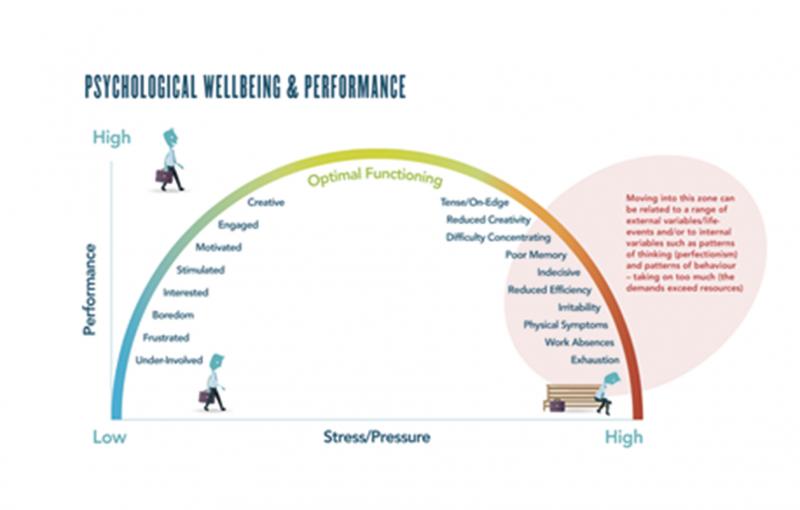
No Pressure: The left hand side of this graph shows how it is difficult to perform at our best if there is no pressure: we can feel under-involved, bored and frustrated.
Optimal Function: Some stress is good for us. Most of us need goals, a degree of pressure, or ‘stretch’, to fulfil our potential. Academic studies show that employees with positive psychological wellbeing have on average 31% higher productivity, their sales are 37% higher, and their creativity is three times higher.
In the ‘red zone’: The reality is that most of us will get stressed at certain times and find ourselves moving to the right hand side of the curve, especially when we experience setbacks or protracted periods of pressure. A short visit is OK, but staying in the ‘red zone’ for long periods can have significant implications for an individual’s health, work performance and quality of life. It has a negative impact on an individual’s skills, reducing concentration, memory, decision making, creativity and innovation. Extended periods of stress is associated with a wide range of unpleasant physical symptoms and ill health. Dr Brian Marien (Founder of The Positive Group). © Positive 2014
Tackling the issue of “wellbeing of the Bar”
Working with our partners, the Bar Council established a small steering group including the four Inns of Court, the Institute of Barristers’ Clerks, liaising with the Circuits, Specialist Bar Associations and individual chambers and members of the Bar with a keen interest in the issue.
During October and November last year we undertook a survey across the Bar to gather empirical data and better understand individual and environmental work place risk factors unique to the Bar.
The aim of the research was always to help us to determine what we needed to do to support wellbeing across the profession, be it support and resources for chambers, students or practising barristers.
The Bar’s Wellbeing Survey was developed based on a scientific “resilience framework assessment” by The Positive Group, a specialist consultancy made up of highly qualified experts in psychology, neuroscience and medicine.
What the survey told us about wellbeing at the Bar
This was the first time – in any country – that a whole profession has been surveyed by their governing body on wellbeing. Thanks to the combined efforts of leadership and many individuals “championing” the project, 2,456 people (approximately 16% of the profession) took part. (In the Autumn of 2014 there were 15,415 practising barristers according to Bar Council data on the profession).
Participants came from all sectors of the Bar: 88% were self-employed and 12% were employed; 41% were female and 59% male; 55% were aged 45 or less. Approximately half of the respondents had been in practice for fewer than 15 years, whilst 36% had practised for over 20 years. Responses were received from all Circuits and practice areas, as well as from those who declared no specific affiliation. This enabled us to determine there were no significant differences in wellbeing based on respondents’ gender, disability or caring responsibility. More generally the highest work pressure, lowest mood and lowest life satisfaction was felt by those between the age of 35 and 55, an age bracket generally associated with lower life satisfaction.
Those who took part in the survey told us the best things about working for the Bar included the strong sense of purpose, a sense of belonging, challenge and variety as well as a sense of professional standing. But more worryingly the survey also told us many participants demonstrated notable levels of rumination and self-critical perfectionism. This is of concern. Rumination means individuals dwell on mistakes and problems; perfectionism concerns pressures that emanate from the standards expected of oneself and from others for continual excellence and perfectionism. Unhealthy perfectionism is known to be closely linked with ill health and burn out.
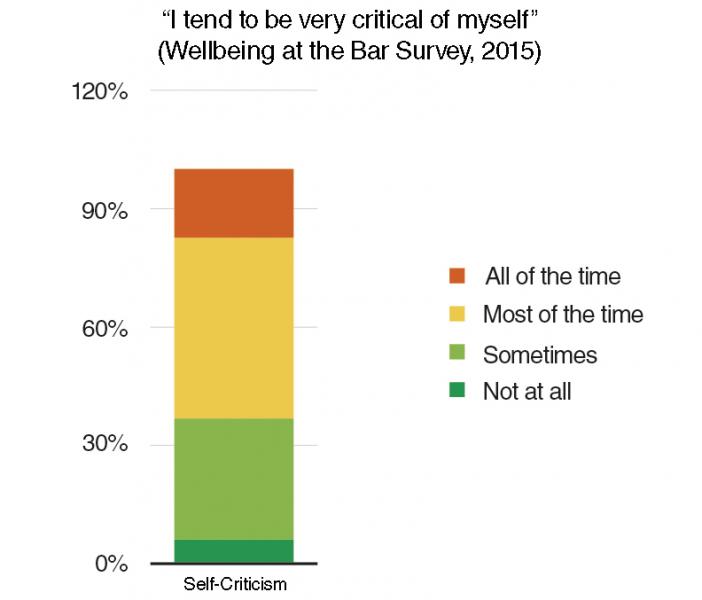
The criminal Bar respondents demonstrated lower levels of wellbeing and resilience than other practice areas, with low mood, high stress and poor work/life balance. Financial concerns linked to fee levels, cash flow and gaining work were noted as key challenges to working at the self-employed Bar. Those at the employed Bar listed lower remuneration as the challenging factor.
The self-employed Bar reported lower levels of engagement than the employed Bar, despite the fact those at the employed Bar reported feeling a reduced sense of status relative to the self-employed Bar.
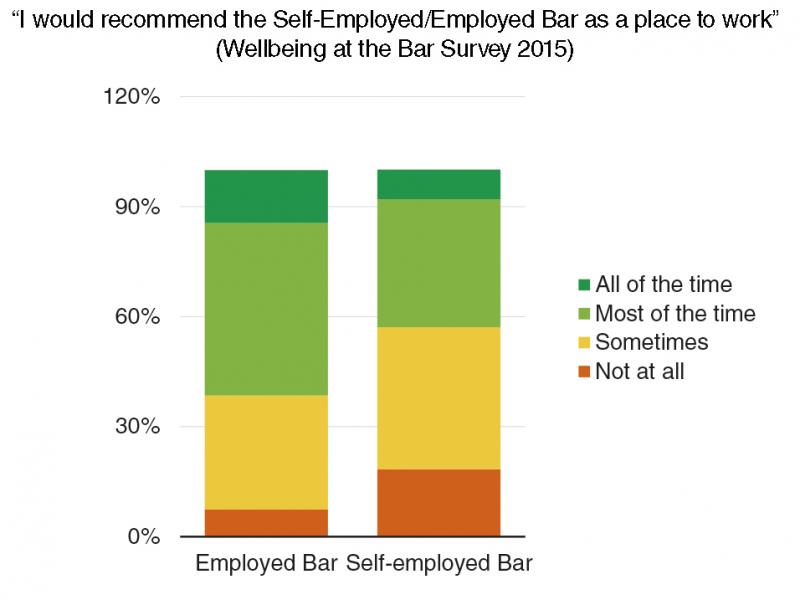
One of the most significant findings concerned mentoring. Those that were mentored at work demonstrated greater resilience where mentoring effectively provides social support and a structure for learning. Only 385 respondents (16%) said that they participated in formal or informal mentoring at work.
The majority of respondents (63%) agreed that showing signs of stress at work indicated personal weakness. Stigma has a significant impact on individuals dealing and coping with stress at work, which in turn may add to the pressure they experience.
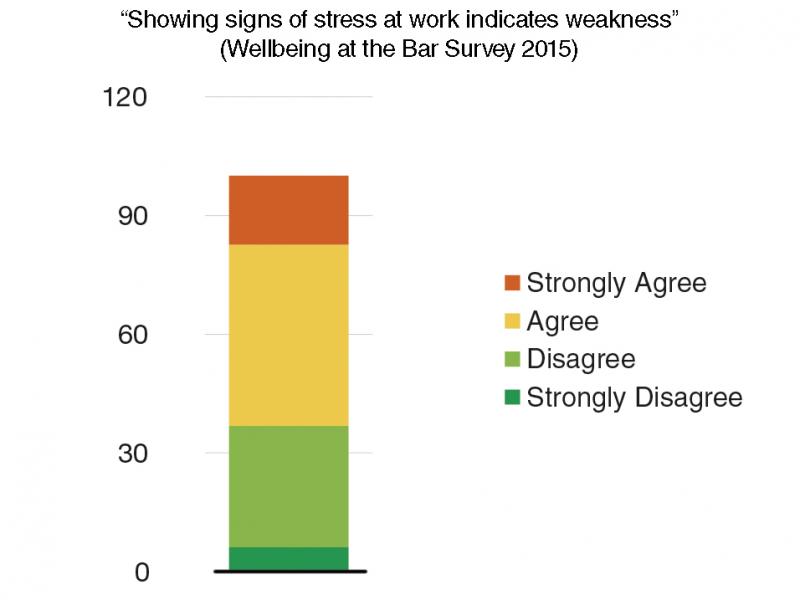
Where next?
Addressing the issues identified by the survey is high on the agenda of all those with a leadership role across the Bar. Over the next few weeks the steering group will be expanded and a working group made up of representatives from across the Bar Council, the Inns, Circuits and SBAs will be established. The services of those who championed the original survey will be called upon to help shape and disseminate products and services designed to support wellbeing. We will be working to identify existing good practice, to help us develop resources for chambers and others. We will also work with LawCare, Mind and other specialists to ensure those that need help get the right sort of help and are able to speak to those with an understanding of the profession. The high level of engagement from all areas of the Bar indicated a willingness to lead on changing the way that we manage our wellbeing, not only to support and maintain our own performance but also to equip the next generation for a rewarding, but very challenging career.
We are interested to hear from practitioners with experience of any professional services which may be relevant to this work, or from those who have experience which they would like to share to further inform us in the product that we develop. For further information, please contact Sam Mercer, Head of Policy, Equality and Diversity and CSR at the Bar Council atsmercer@barcouncil.org.uk.
Further reading:
Contributor Rachel Spearing
Pump Court Chambers, Chair of the Bar Wellbeing project
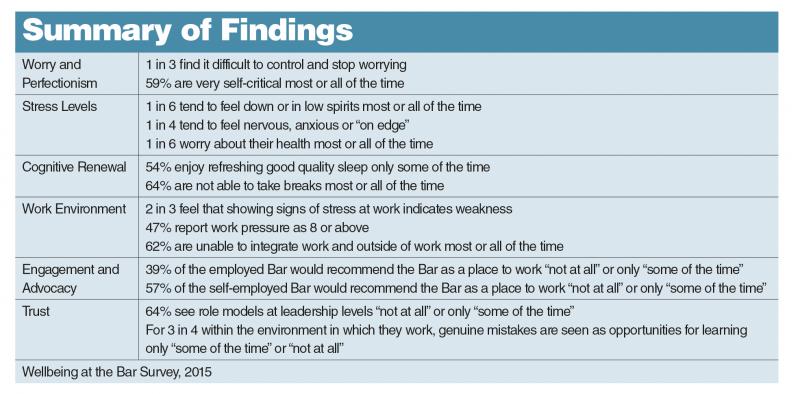
Psychological wellbeing within the profession (and mental health more generally) is rarely spoken about, but within the Bar’s relatively small community everyone is affected by their own or colleagues’ poor psychological health; be it substance abuse (food, drugs and alcohol) associated with stress, the breakdown of relationships, premature exit from the Bar or, in more extreme cases, suicide.
The evolving legal services market and demands placed upon those within it, mean that we must prepare members of the profession to have the resilience to meet these pressures. Recognising this, the Bar Council has been leading an initiative over the last 14 months, supported by the Inns of Court and the Charlie Waller Memorial Trust, looking at “wellbeing” right across the Bar. We wanted to understand how we could better support the profession within the unique environment in which we operate.
Wellbeing is described as a state “where the individual realizes his or her own abilities, can cope with the normal stresses of life, can work productively and fruitfully and is able to make a contribution to his or her own community.”(Prescribed definition by World Health Organisation.)
(Some) stress is good
In considering wellbeing, it is important to acknowledge some stress is good. Stress and pressure in many studies has been proven to be a healthy stimulant and may explain why so many of us often feel “addicted” to the high points of our day job. But problems can begin when we are unable to recognise and manage these work/life pressures and they build and start to have an adverse impact on our performance and health.

No Pressure: The left hand side of this graph shows how it is difficult to perform at our best if there is no pressure: we can feel under-involved, bored and frustrated.
Optimal Function: Some stress is good for us. Most of us need goals, a degree of pressure, or ‘stretch’, to fulfil our potential. Academic studies show that employees with positive psychological wellbeing have on average 31% higher productivity, their sales are 37% higher, and their creativity is three times higher.
In the ‘red zone’: The reality is that most of us will get stressed at certain times and find ourselves moving to the right hand side of the curve, especially when we experience setbacks or protracted periods of pressure. A short visit is OK, but staying in the ‘red zone’ for long periods can have significant implications for an individual’s health, work performance and quality of life. It has a negative impact on an individual’s skills, reducing concentration, memory, decision making, creativity and innovation. Extended periods of stress is associated with a wide range of unpleasant physical symptoms and ill health. Dr Brian Marien (Founder of The Positive Group). © Positive 2014
Tackling the issue of “wellbeing of the Bar”
Working with our partners, the Bar Council established a small steering group including the four Inns of Court, the Institute of Barristers’ Clerks, liaising with the Circuits, Specialist Bar Associations and individual chambers and members of the Bar with a keen interest in the issue.
During October and November last year we undertook a survey across the Bar to gather empirical data and better understand individual and environmental work place risk factors unique to the Bar.
The aim of the research was always to help us to determine what we needed to do to support wellbeing across the profession, be it support and resources for chambers, students or practising barristers.
The Bar’s Wellbeing Survey was developed based on a scientific “resilience framework assessment” by The Positive Group, a specialist consultancy made up of highly qualified experts in psychology, neuroscience and medicine.
What the survey told us about wellbeing at the Bar
This was the first time – in any country – that a whole profession has been surveyed by their governing body on wellbeing. Thanks to the combined efforts of leadership and many individuals “championing” the project, 2,456 people (approximately 16% of the profession) took part. (In the Autumn of 2014 there were 15,415 practising barristers according to Bar Council data on the profession).
Participants came from all sectors of the Bar: 88% were self-employed and 12% were employed; 41% were female and 59% male; 55% were aged 45 or less. Approximately half of the respondents had been in practice for fewer than 15 years, whilst 36% had practised for over 20 years. Responses were received from all Circuits and practice areas, as well as from those who declared no specific affiliation. This enabled us to determine there were no significant differences in wellbeing based on respondents’ gender, disability or caring responsibility. More generally the highest work pressure, lowest mood and lowest life satisfaction was felt by those between the age of 35 and 55, an age bracket generally associated with lower life satisfaction.
Those who took part in the survey told us the best things about working for the Bar included the strong sense of purpose, a sense of belonging, challenge and variety as well as a sense of professional standing. But more worryingly the survey also told us many participants demonstrated notable levels of rumination and self-critical perfectionism. This is of concern. Rumination means individuals dwell on mistakes and problems; perfectionism concerns pressures that emanate from the standards expected of oneself and from others for continual excellence and perfectionism. Unhealthy perfectionism is known to be closely linked with ill health and burn out.

The criminal Bar respondents demonstrated lower levels of wellbeing and resilience than other practice areas, with low mood, high stress and poor work/life balance. Financial concerns linked to fee levels, cash flow and gaining work were noted as key challenges to working at the self-employed Bar. Those at the employed Bar listed lower remuneration as the challenging factor.
The self-employed Bar reported lower levels of engagement than the employed Bar, despite the fact those at the employed Bar reported feeling a reduced sense of status relative to the self-employed Bar.

One of the most significant findings concerned mentoring. Those that were mentored at work demonstrated greater resilience where mentoring effectively provides social support and a structure for learning. Only 385 respondents (16%) said that they participated in formal or informal mentoring at work.
The majority of respondents (63%) agreed that showing signs of stress at work indicated personal weakness. Stigma has a significant impact on individuals dealing and coping with stress at work, which in turn may add to the pressure they experience.

Where next?
Addressing the issues identified by the survey is high on the agenda of all those with a leadership role across the Bar. Over the next few weeks the steering group will be expanded and a working group made up of representatives from across the Bar Council, the Inns, Circuits and SBAs will be established. The services of those who championed the original survey will be called upon to help shape and disseminate products and services designed to support wellbeing. We will be working to identify existing good practice, to help us develop resources for chambers and others. We will also work with LawCare, Mind and other specialists to ensure those that need help get the right sort of help and are able to speak to those with an understanding of the profession. The high level of engagement from all areas of the Bar indicated a willingness to lead on changing the way that we manage our wellbeing, not only to support and maintain our own performance but also to equip the next generation for a rewarding, but very challenging career.
We are interested to hear from practitioners with experience of any professional services which may be relevant to this work, or from those who have experience which they would like to share to further inform us in the product that we develop. For further information, please contact Sam Mercer, Head of Policy, Equality and Diversity and CSR at the Bar Council atsmercer@barcouncil.org.uk.
Further reading:
Contributor Rachel Spearing
Pump Court Chambers, Chair of the Bar Wellbeing project

Rachel Spearing reviews the results from the Bar Council’s first survey of the wellbeing of the profession
The Bar, by its very nature, is a stressful place to work, regardless of Call, practice area or status and we are all aware of the levels of stigma associated with displaying any sign of weakness.


Kirsty Brimelow KC, Chair of the Bar, sets our course for 2026
What meaningful steps can you take in 2026 to advance your legal career? asks Thomas Cowan of St Pauls Chambers
Marie Law, Director of Toxicology at AlphaBiolabs, explains why drugs may appear in test results, despite the donor denying use of them
Asks Louise Crush of Westgate Wealth Management
AlphaBiolabs has donated £500 to The Christie Charity through its Giving Back initiative, helping to support cancer care, treatment and research across Greater Manchester, Cheshire and further afield
Q and A with criminal barrister Nick Murphy, who moved to New Park Court Chambers on the North Eastern Circuit in search of a better work-life balance
The appointments of 96 new King’s Counsel (also known as silk) are announced today
With pupillage application season under way, Laura Wright reflects on her route to ‘tech barrister’ and offers advice for those aiming at a career at the Bar
Jury-less trial proposals threaten fairness, legitimacy and democracy without ending the backlog, writes Professor Cheryl Thomas KC (Hon), the UK’s leading expert on juries, judges and courts
Are you ready for the new way to do tax returns? David Southern KC explains the biggest change since HMRC launched self-assessment more than 30 years ago... and its impact on the Bar
Marking one year since a Bar disciplinary tribunal dismissed all charges against her, Dr Charlotte Proudman discusses the experience, her formative years and next steps. Interview by Anthony Inglese CB